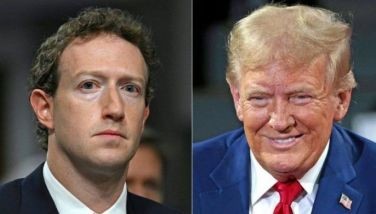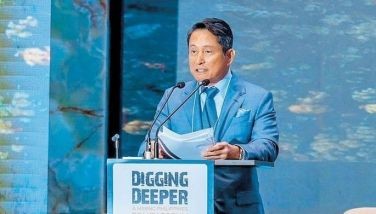RP mulls shielding petrochemicals despite AFTA
September 13, 2002 | 12:00am
BANDAR SERI BEGAWAN (AFP) – The Philippines sent notice Wednesday it may delay the liberalization of its petrochemicals industry, raising concerns it could undermine the ASEAN Free Trade Area (AFTA) and hit investor confidence in the region.
Trade Secretary Manuel Roxas II informed AFTA’s council of economic ministers about Manila’s intention to defer the opening up of the nascent sector during a meeting in Brunei, a move that raised concerns of backsliding on market-opening commitments.
The council, which monitors commitments by the 10-member Association of Southeast Asian Nations (ASEAN) to the free-trade area, met on the eve of the ministers’ annual gathering.
Under AFTA rules, countries may seek to temporarily opt out of their commitments in sectors which they feel are not prepared to face foreign competition.
Malaysia was the first member to invoke the mechanism to allow it to delay opening up of its auto market. Negotiations are underway with the most affected country, Thailand, on compensation for potential losses.
In a statement issued after a meeting of the AFTA Council, the ministers said they "noted the Philippines’ intention to possibly invoke the protocol" and added that "no consensus was reached and further discussions will be carried out."
Roxas did not indicate when Manila would invoke the mechanism.
Ernest Bower, the president of the US-ASEAN Business Council which seeks to promote ASEAN to US investors, earlier Wednesday cautioned against more countries invoking the opt-out mechanism after learning of Manila’s intentions in press reports.
"We’re more concerned (now) about these issues because part of our concerns expressed in previous meetings with the ASEAN economic ministers appears to be coming home to roost," Bower told reporters.
He said Malaysia’s decision to shield its auto industry would "hinder world class investments" in ASEAN. Auto executives in the United States have said they would prefer to see ASEAN as an integral market, and not a market of 10 individual states.
Bower said more countries seeking to delay their free-trade commitments would "undercut investors’ confidence to move forward in all sectors."
He said the message of US business leaders to the economic ministers was: "Please do not go down this trap of undermining AFTA. Please hold the AFTA commitments and do not let countries try to slip."
Singapore Trade Minister George Yeo said the ministers spent a lot of time discussing the impact of the Philippines’ move.
Yeo said Singapore would seek consultations once Manila invokes the protocol because the city-state is the most important Southeast Asian supplier of petrochemical products to the Philippines.
But "our concern is not so much in the specific items involved but with the signalling effect it will have on ASEAN as a whole," he said in a joint news conference. "And it is really the signalling effect which we spent a lot of time discussing today."
Brunei Minister of Industry and Primary Resources Abdul Rahman Taib dismissed the US business leaders’ concerns over possible backpedalling.
"There is no question of backsliding as far as we are concerned on AFTA. AFTA is on track," he said at the press conference.
"There are problems that may arise from time to time and we are dealing with the problems when they come," Taib added.
Roxas also defended his country’s move.
"The Philippines remains committed to AFTA and within AFTA certain protocols are available for countries such as the Philippines to defer the submission of certain tariff lines into the inclusion list," he said.
The ministers also pointed out that 96.24 percent of products contained in an inclusion list for liberalization have had their tariffs cut to between zero and five percent this year among ASEAN’s six senior members – Brunei, Indonesia, Malaysia, the Philippines, Singapore and Thailand.
"So a particular country raising a concern or an issue does not necessarily indicate backsliding by any measure," Roxas said.
Trade Secretary Manuel Roxas II informed AFTA’s council of economic ministers about Manila’s intention to defer the opening up of the nascent sector during a meeting in Brunei, a move that raised concerns of backsliding on market-opening commitments.
The council, which monitors commitments by the 10-member Association of Southeast Asian Nations (ASEAN) to the free-trade area, met on the eve of the ministers’ annual gathering.
Under AFTA rules, countries may seek to temporarily opt out of their commitments in sectors which they feel are not prepared to face foreign competition.
Malaysia was the first member to invoke the mechanism to allow it to delay opening up of its auto market. Negotiations are underway with the most affected country, Thailand, on compensation for potential losses.
In a statement issued after a meeting of the AFTA Council, the ministers said they "noted the Philippines’ intention to possibly invoke the protocol" and added that "no consensus was reached and further discussions will be carried out."
Roxas did not indicate when Manila would invoke the mechanism.
Ernest Bower, the president of the US-ASEAN Business Council which seeks to promote ASEAN to US investors, earlier Wednesday cautioned against more countries invoking the opt-out mechanism after learning of Manila’s intentions in press reports.
"We’re more concerned (now) about these issues because part of our concerns expressed in previous meetings with the ASEAN economic ministers appears to be coming home to roost," Bower told reporters.
He said Malaysia’s decision to shield its auto industry would "hinder world class investments" in ASEAN. Auto executives in the United States have said they would prefer to see ASEAN as an integral market, and not a market of 10 individual states.
Bower said more countries seeking to delay their free-trade commitments would "undercut investors’ confidence to move forward in all sectors."
He said the message of US business leaders to the economic ministers was: "Please do not go down this trap of undermining AFTA. Please hold the AFTA commitments and do not let countries try to slip."
Singapore Trade Minister George Yeo said the ministers spent a lot of time discussing the impact of the Philippines’ move.
Yeo said Singapore would seek consultations once Manila invokes the protocol because the city-state is the most important Southeast Asian supplier of petrochemical products to the Philippines.
But "our concern is not so much in the specific items involved but with the signalling effect it will have on ASEAN as a whole," he said in a joint news conference. "And it is really the signalling effect which we spent a lot of time discussing today."
Brunei Minister of Industry and Primary Resources Abdul Rahman Taib dismissed the US business leaders’ concerns over possible backpedalling.
"There is no question of backsliding as far as we are concerned on AFTA. AFTA is on track," he said at the press conference.
"There are problems that may arise from time to time and we are dealing with the problems when they come," Taib added.
Roxas also defended his country’s move.
"The Philippines remains committed to AFTA and within AFTA certain protocols are available for countries such as the Philippines to defer the submission of certain tariff lines into the inclusion list," he said.
The ministers also pointed out that 96.24 percent of products contained in an inclusion list for liberalization have had their tariffs cut to between zero and five percent this year among ASEAN’s six senior members – Brunei, Indonesia, Malaysia, the Philippines, Singapore and Thailand.
"So a particular country raising a concern or an issue does not necessarily indicate backsliding by any measure," Roxas said.
BrandSpace Articles
<
>
- Latest
- Trending
Trending
Latest
Trending
Latest
Recommended
January 30, 2025 - 12:00am
January 29, 2025 - 12:00am


























